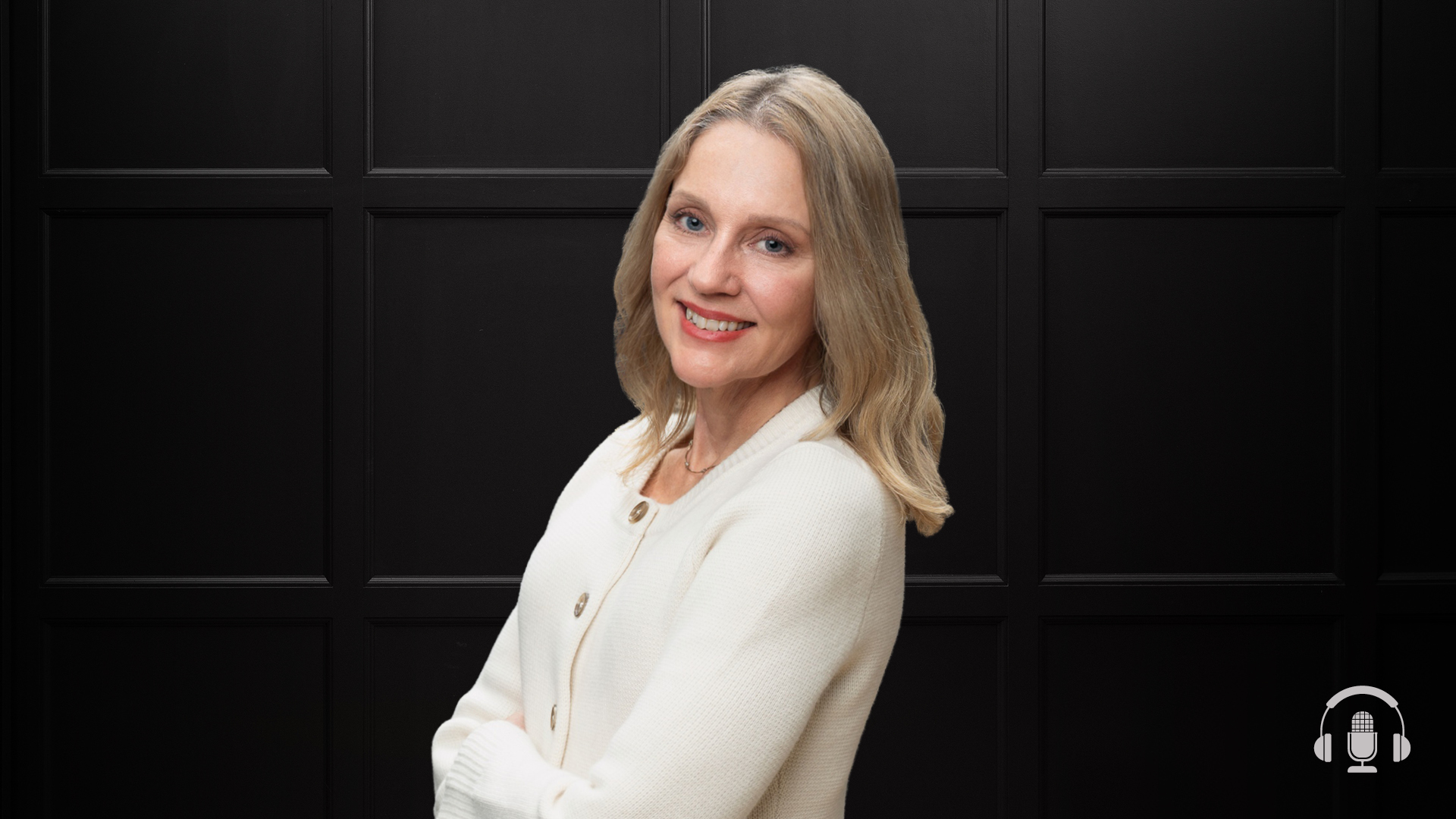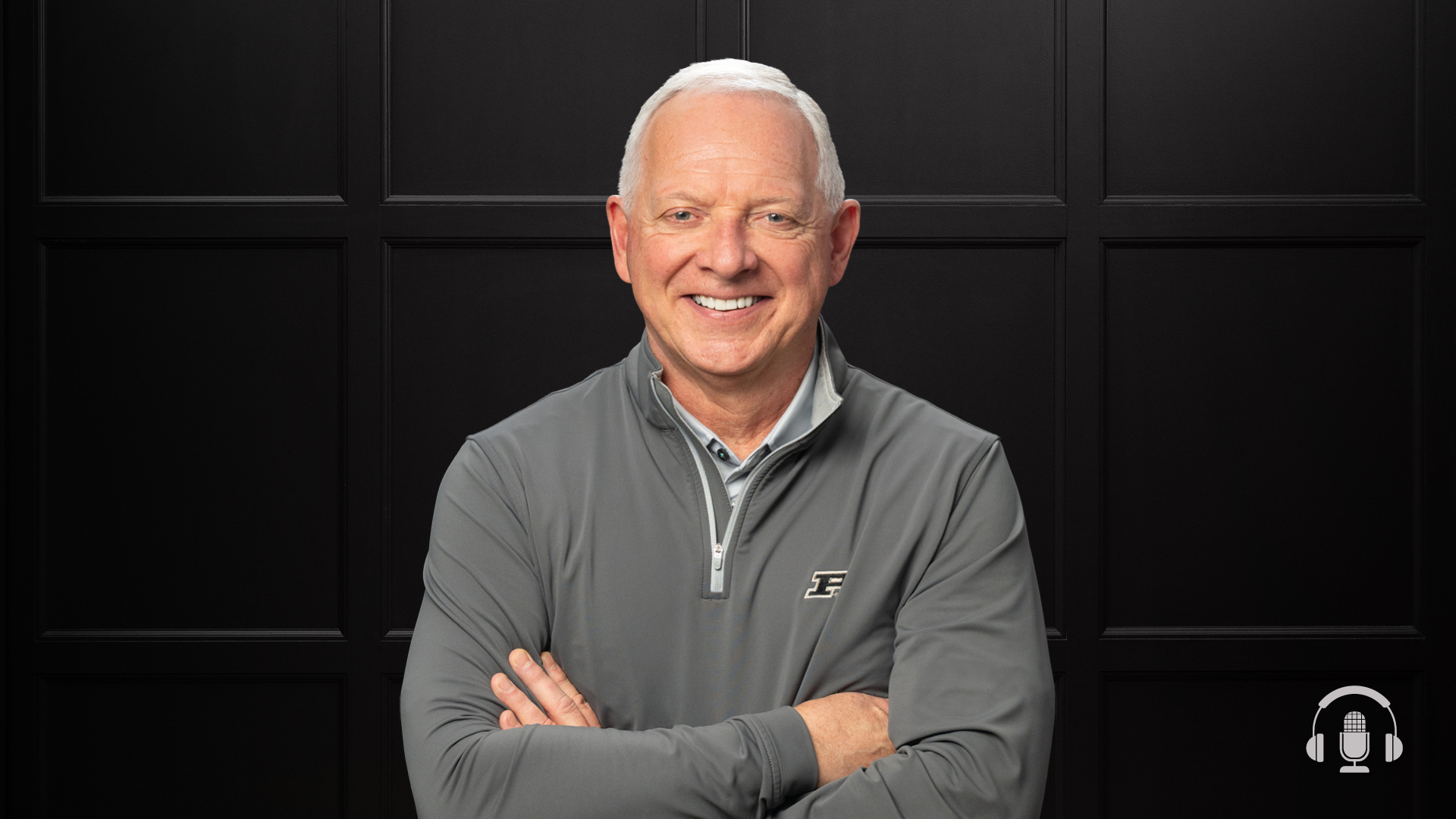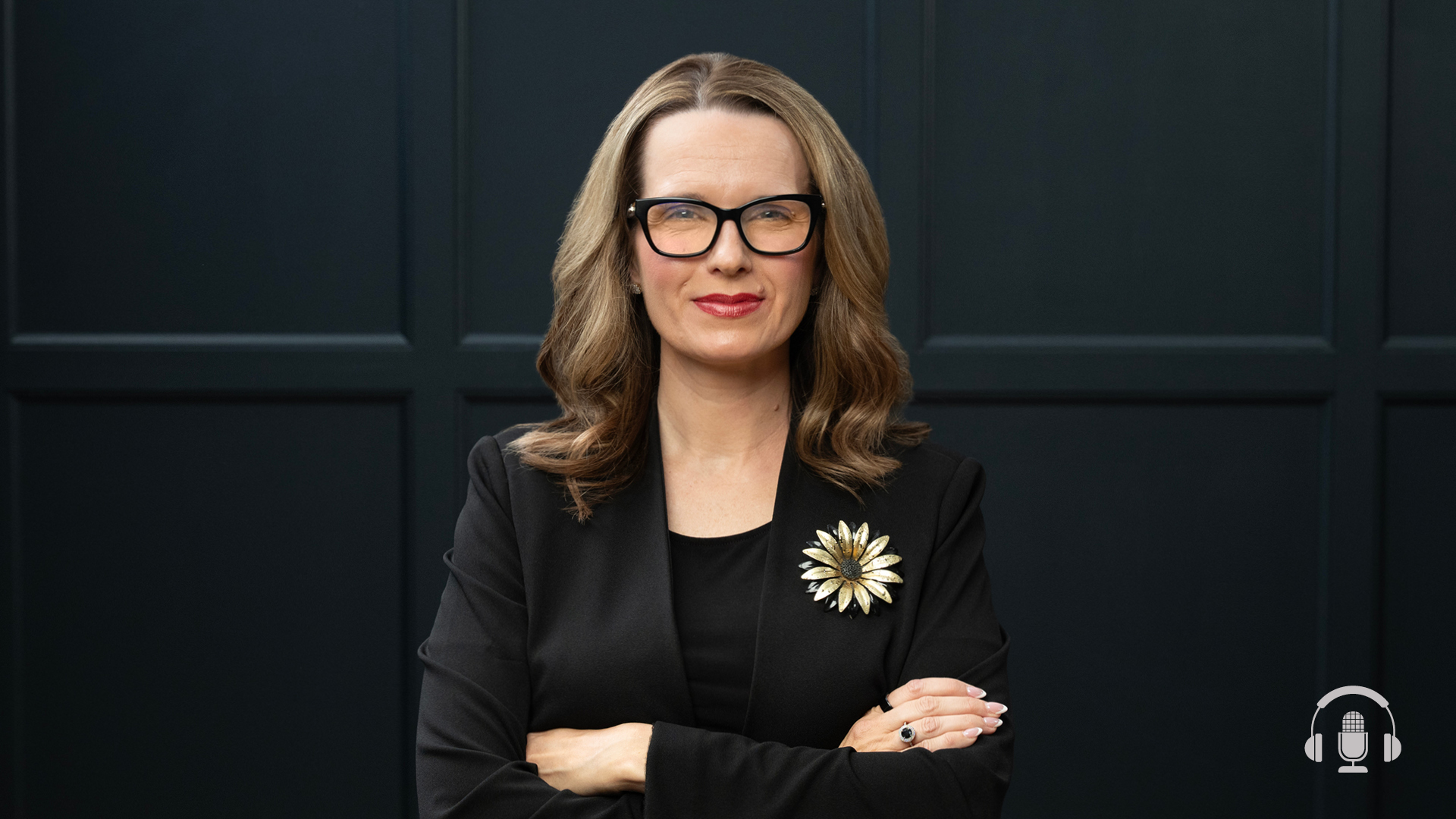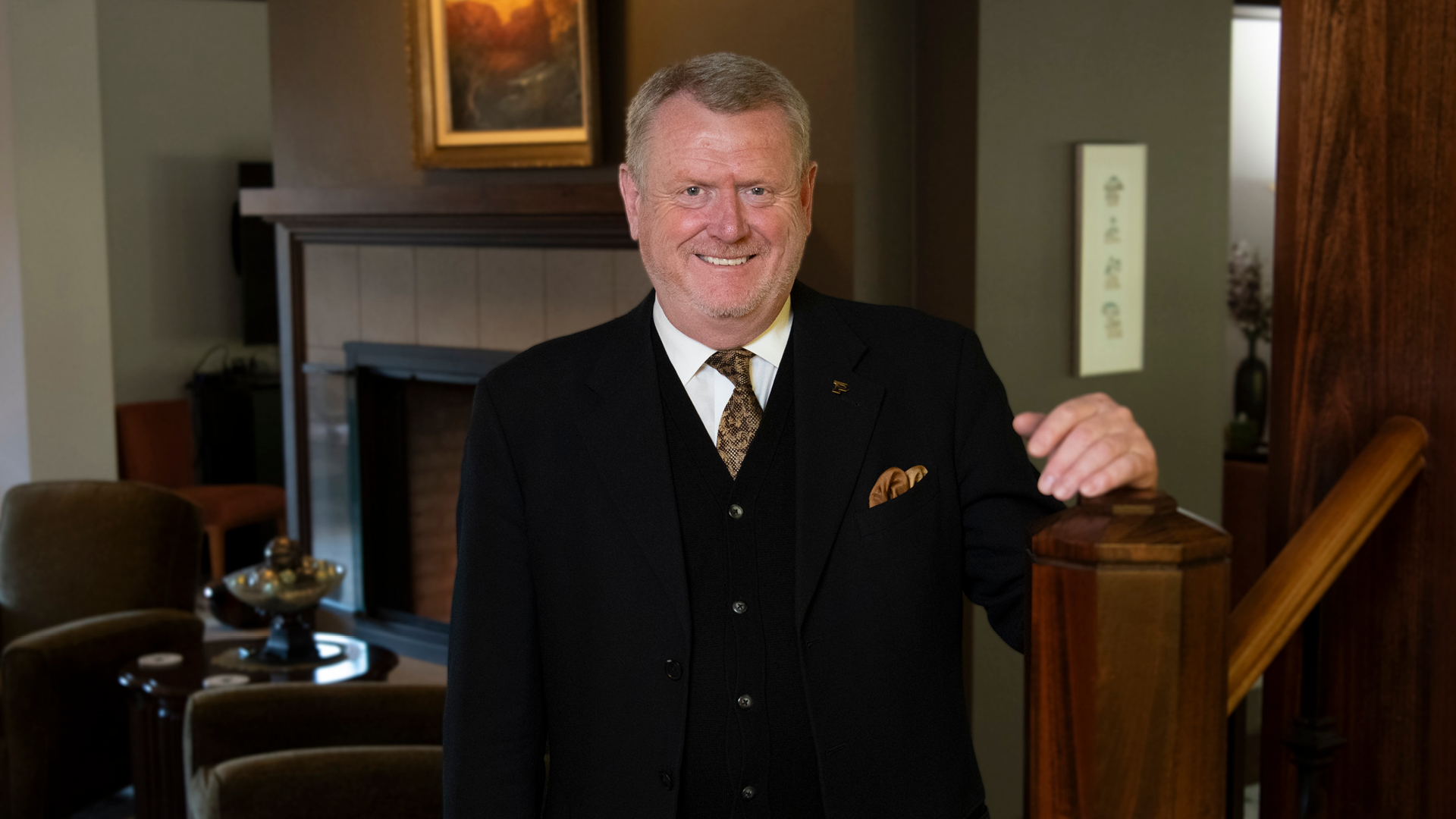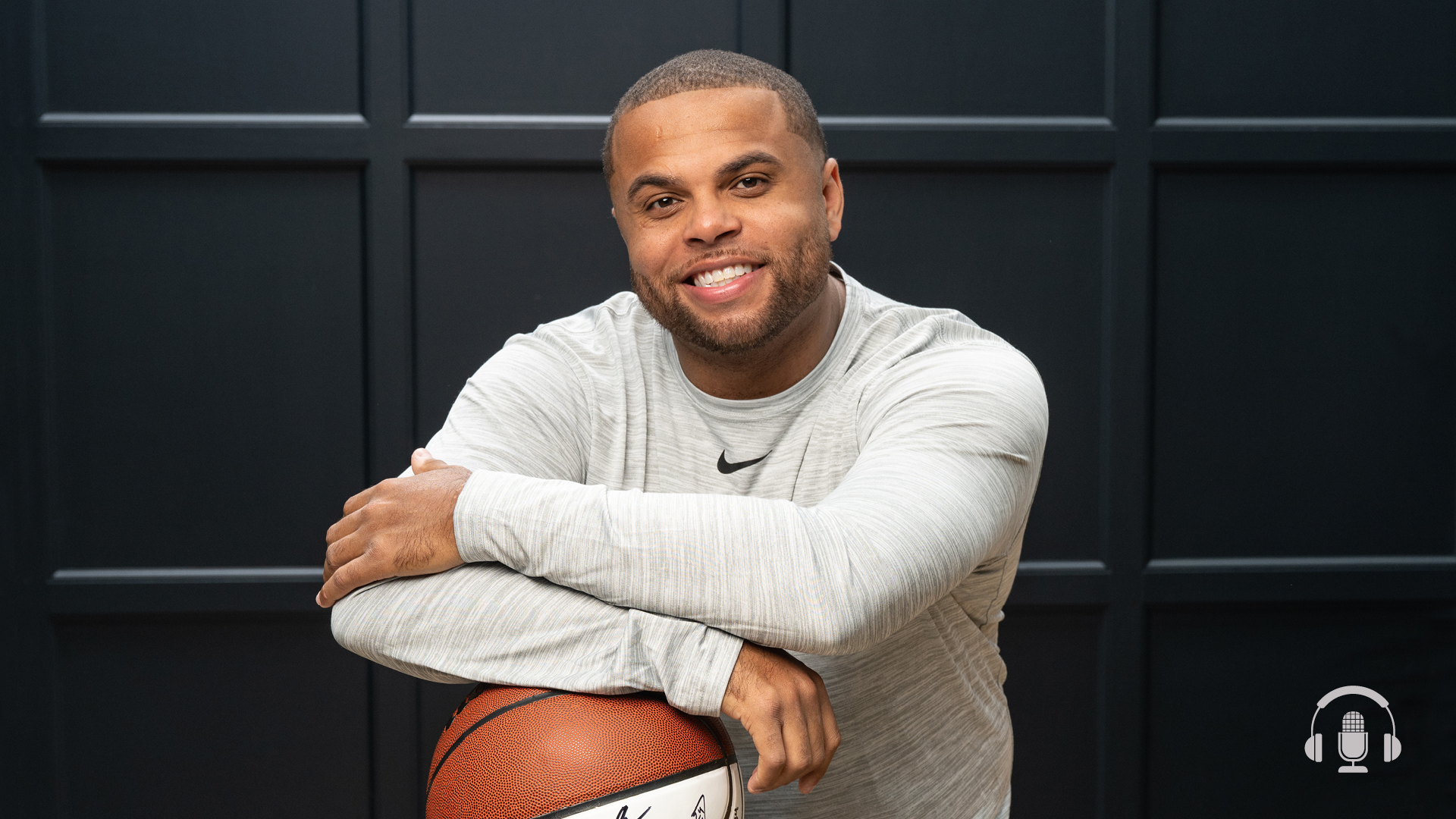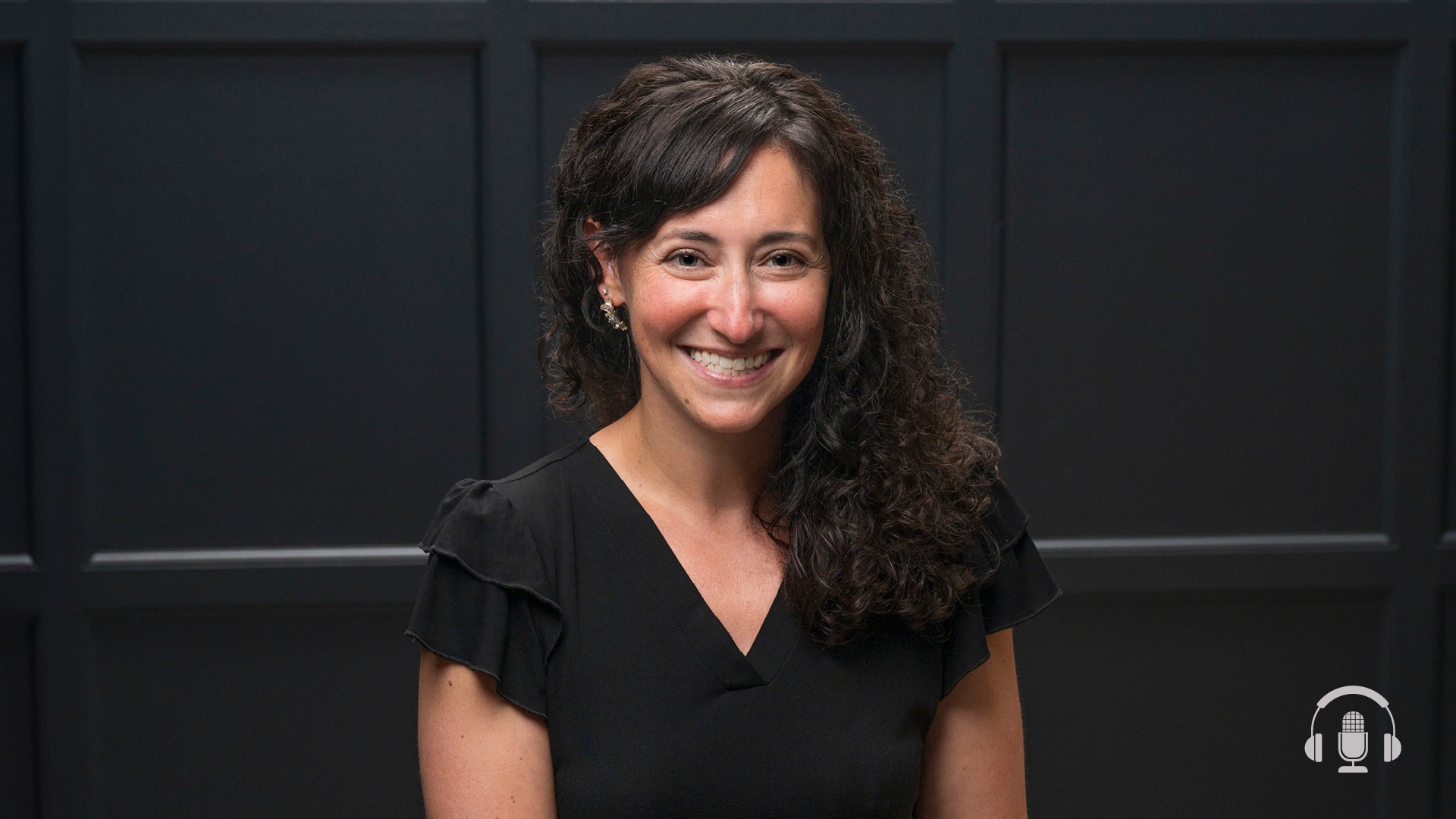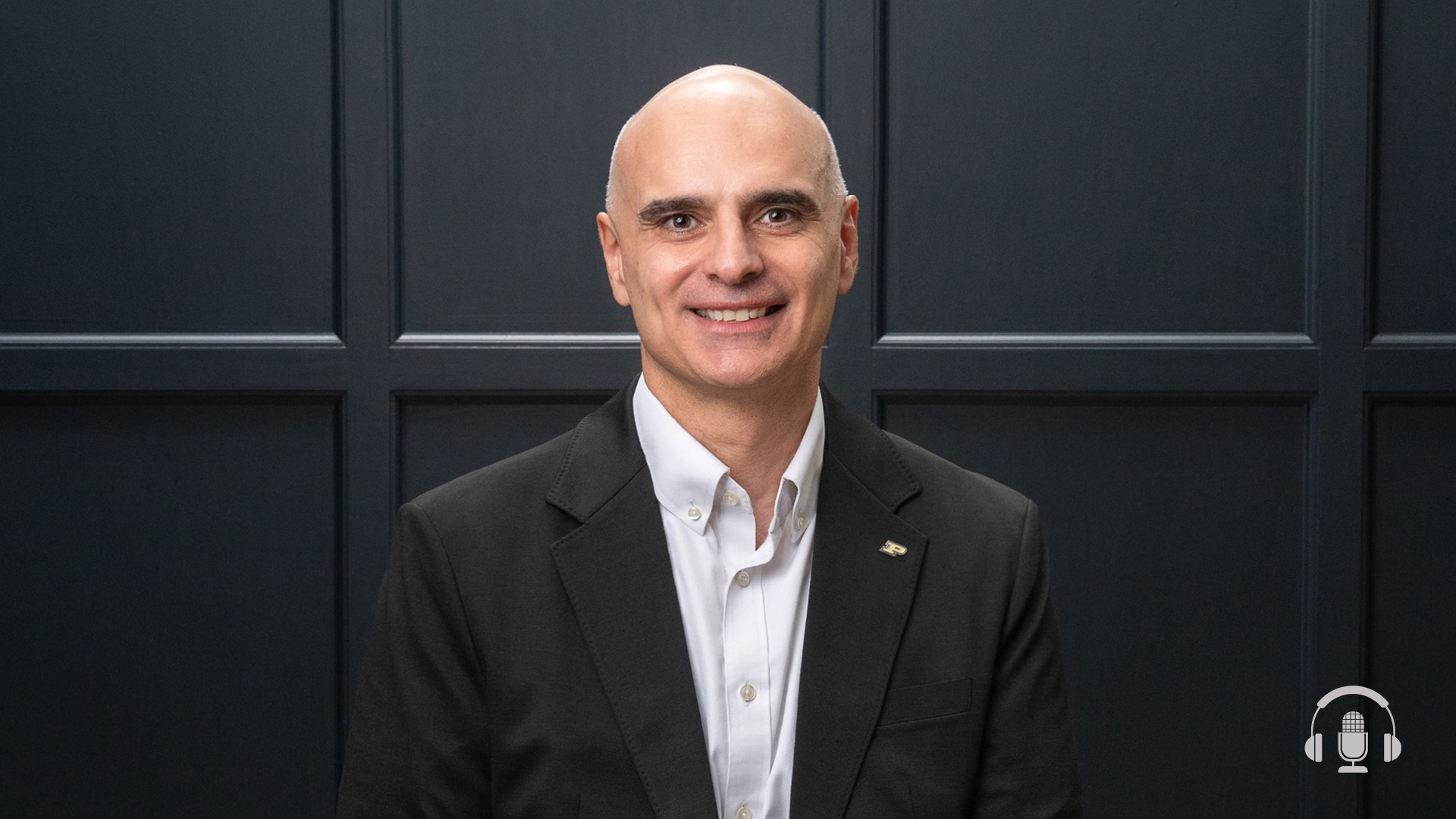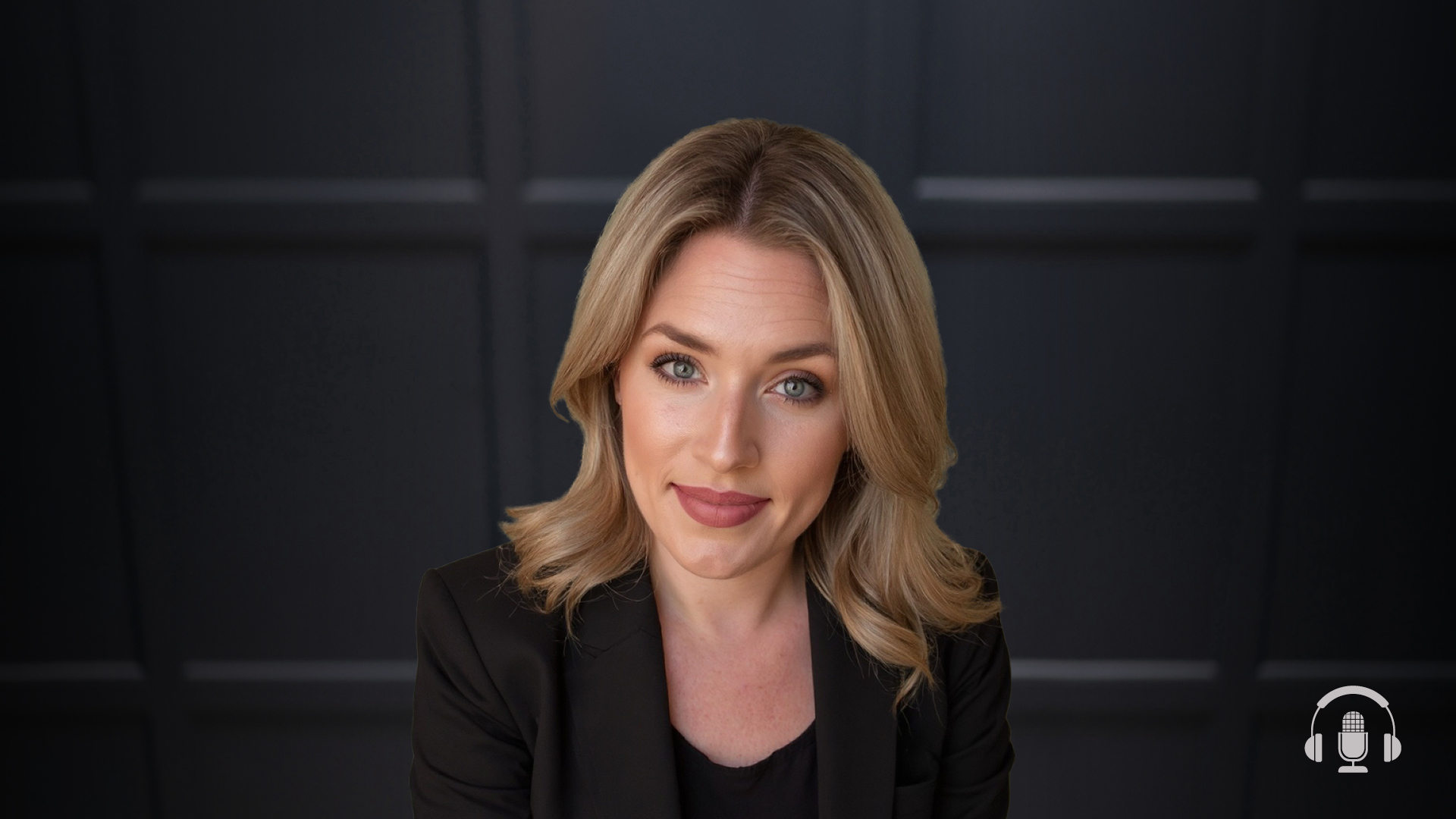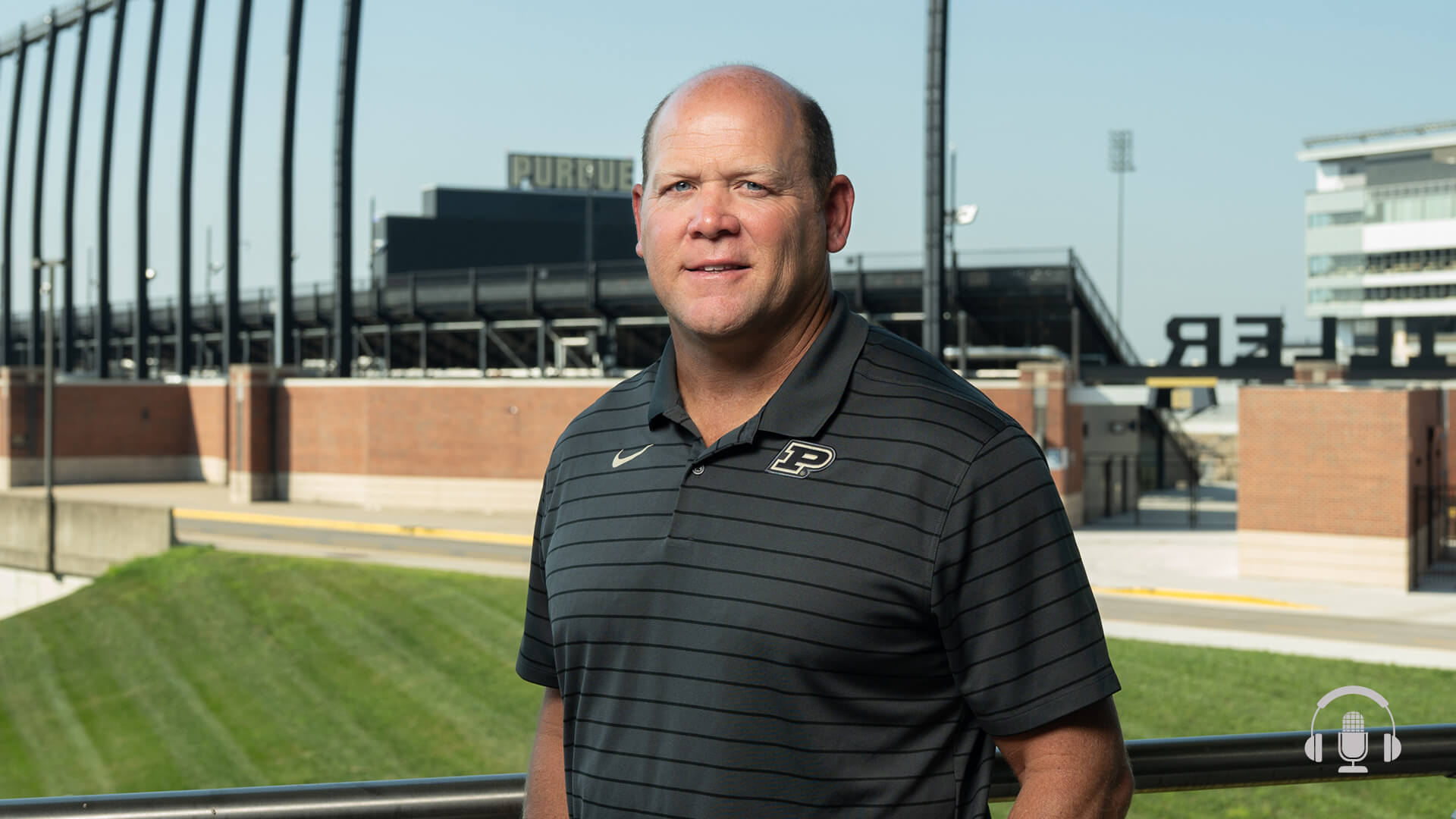Podcast Ep. 134: Is College Still Worth It? (And How It’s Rapidly Changing)
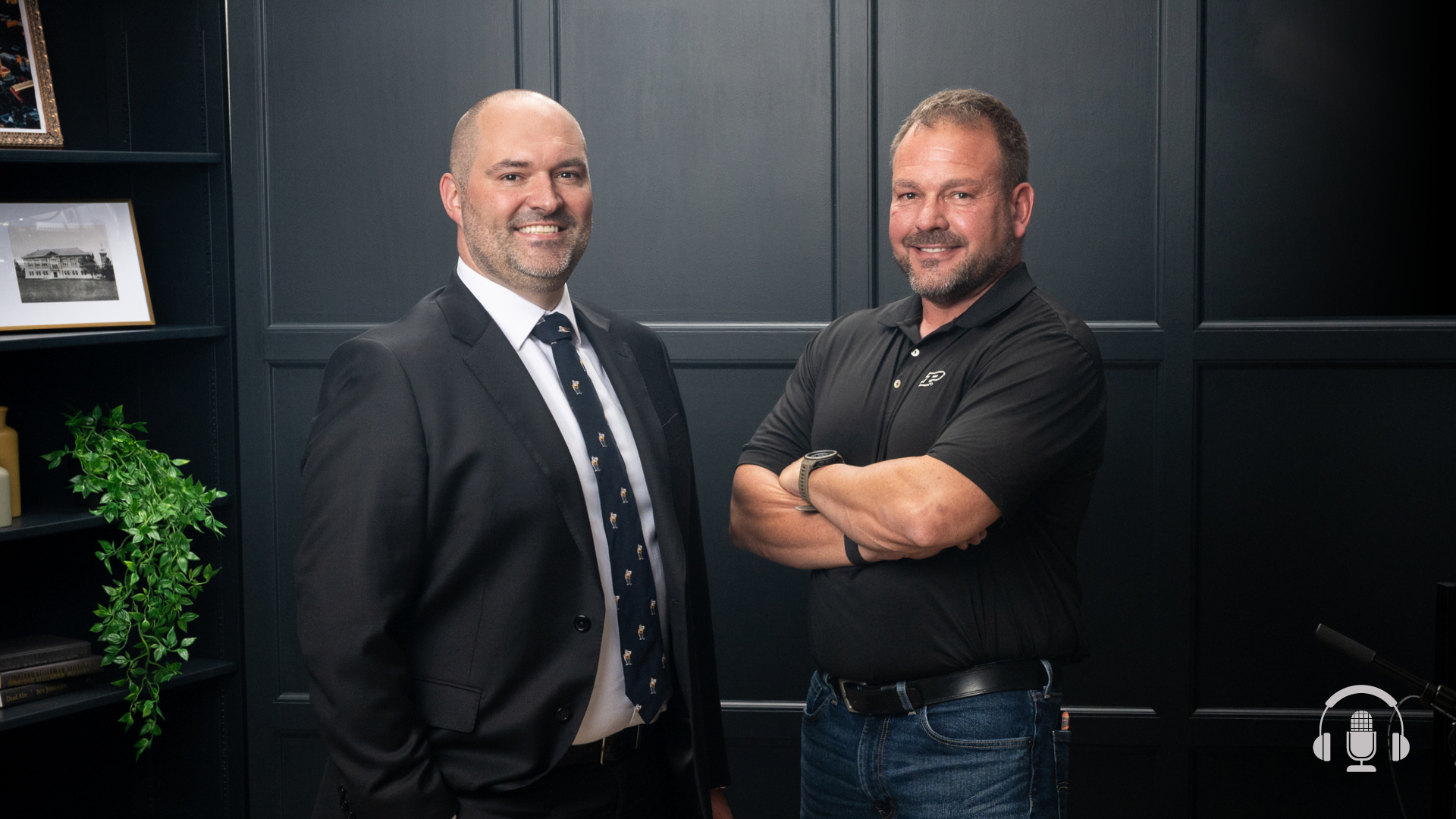
In this episode of “This Is Purdue,” we’re talking to Matt Butler, the senior associate commissioner and chief academic officer for the Indiana Commission for Higher Education, and Brent Yeagy, president and CEO of Wabash National Corp.
Matt is a Purdue College of Liberal Arts alum and a higher education and workforce expert, previously serving as a senior policy advisor for former Gov. Eric Holcomb. Now he works to ensure that Indiana’s postsecondary offerings are meeting current and future workforces where they are. Brent has spearheaded strategic direction and operations for Wabash since 2018. As a campus partner and Purdue College of Engineering alum, he’s seen firsthand how Boilermakers are driving innovation and excellence at scale.
And today — in an intriguing roundtable discussion — they’re diving into a hot-button issue: Is college still worth it?
In this episode, you will:
- Hear why a college degree remains crucial, now more than ever, empowering students to grow and plan for their futures.
- Discover why a Purdue degree is an invaluable investment from both industry and government perspectives.
- Learn how Purdue’s continued frozen tuition benefits bottom lines for Indiana students and families, addresses student debt, and sets a national standard.
- Understand what traits and experiences top employers are seeking from new graduates and why Purdue’s role as a premier land-grant research institution is key to providing students with well-rounded opportunities.
- Gain insights into Purdue and Wabash’s strategic relationship and how it’s delivering top-tier sustainability research and innovation in the transportation industry.
- Find out how the university’s evolving offerings and the state’s higher ed initiatives overall are enhancing the ROI for students and families.
You don’t want to miss this timely episode with Boilermakers who are making great strides in Indiana higher ed and industry innovation to provide a wealth of academic and professional opportunities for current and future college students!
- Watch the full video interview on YouTube
- Learn more about Matt Butler
- Learn more about Brent Yeagy
- Learn more about the Purdue College of Engineering
- Learn more about the Purdue College of Liberal Arts
- Learn more about Wabash National Corp.
- Learn more about Purdue and Wabash’s partnership
- Learn more about the Indiana Commission for Higher Education
Podcast Transcript
Brent Yeagy:
This is Brent Yeagy and you’re listening to This is Purdue.
Matt Butler:
This is Matt Butler and you’re listening to, This is Purdue.
Kate Young:
Hi, I’m Kate Young and you are listening to This is Purdue, the official podcast for Purdue University. As a Purdue alum and Indiana native, I know firsthand about the family of students and professors who are in it together, persistently pursuing and relentlessly rethinking who are the next game changers, difference makers, ceiling breakers, innovators? Who are these boilermakers? Join me as we feature students, faculty and alumni taking small steps towards their giant leaps and inspiring others to do the same.
Brent Yeagy:
What Purdue has done with freezing tuition, coupling that with a highly prominent top-tier research institution, is the national benchmark. The value that a Purdue student gets today is off the chart.
Matt Butler:
Lots of options in which you can accelerate attainment and increase attainment for better bank through. But I see those are some real trailblazing areas Purdue’s working in.
Kate Young:
In this episode of This is Purdue, we are talking to Brent Yeagy and Matt Butler. Now, you’ve probably seen the headlines about how the value of higher education is rapidly evolving and Brent and Matt are joining us today to answer the question, is college still worth it? Brent is a transportation industry leader and is the president and CEO of Wabash, a logistical equipment manufacturer headquartered in Lafayette, Indiana. He’s been spearheading strategic direction and operations there since 2018. Brent is a Purdue engineering alum and a university partner, which we’ll dig into more here soon, but he’s seen firsthand how a Purdue degree can impact your life and how the university is driving innovation. Matt is a higher education and workforce expert and previously served as a senior policy advisor for former Indiana governor, Eric Holcomb. Matt is a Purdue alum as well. Today Matt serves as the senior associate commissioner and chief academic officer for the Indiana Commission for Higher Education.
In this episode, we’ll discuss Purdue’s approach to affordability, return on investment, and how today’s students are preparing for a future that looks dramatically different from the past. Should people still be investing in higher education and what’s Purdue doing differently when it comes to earning a college degree? We’re diving into all of this and more with Brent and Matt. Here’s our conversation. Brent and Matt, thank you so much for joining us on This is Purdue, Purdue’s official university podcast. So Brent, you are a transportation industry leader, you’re the president and CEO of Wabash National Corp. You’re also a Purdue alum.
Brent Yeagy:
Correct.
Kate Young:
Welcome to the show. And Matt, you’re also a boilermaker alum. Welcome to the show. So, you are a higher education and workforce expert and right now you’re the senior associate commissioner and chief academic officer for the Indiana Commission for Higher Education. You’re working to ensure that the state’s post-secondary offerings are meeting the needs of the modern workforce, which is exactly what we’re going to dive into today. So, we’re eager to get to know both of you and discuss what Purdue is doing differently when it comes to earning a college degree. So we’re just going to get right into it. As I just mentioned, we’re talking about this buzz worthy topic. Do you all think that higher education and a college degree is still worth it?
Brent Yeagy:
I personally have seen that in different media publications, articles, social media, really asking that question, and a lot are advocating on the negative. I would have to say I don’t agree with that in any way, shape or form. And in no way, shape or form has Wabash embraced that mindset in any way, shape or form. I think the process of going through a degree is forming in terms of the maturity and the experiences and the problem solving and the resiliency of people. I think when it’s applied with solid degree programs, with all of the external application of what they learn, it creates a robust experience that employers can leverage. Now, obviously there’s times when maybe a person doesn’t necessarily get into a robust degree program or institution, that’s a different problem, but in terms of saying that’s a general consideration, that it’s not effective, don’t buy into that.
Kate Young:
What about you Matt?
Matt Butler:
I would wholeheartedly agree. The Georgetown Center for Education and Workforce forecasts that 66% of good jobs, good jobs in 2031 will require a bachelor’s degree and most of those will require even more. I think also sometimes when we think of college, we also need to think of post-secondary training like credit bearing certificates, apprenticeships that sometimes have an associate degree with them. So I agree with Brent that in every way, shape or form we have the metrics that the post-secondary credential still has currency, if not even more so. However, individual results may vary, more degrees might be more career relevant than others, especially in such a, when technology’s evolving so much. But I think the other good thing is that we know that who’s your families based on research we’ve done at the Commission for Higher Education, that 80% of students and families value post-secondary education.
Kate Young:
How do you think Purdue is bridging the gap between traditional academics and real world industry needs?
Brent Yeagy:
I’ll go back to when I was at Purdue in the late ’80s, early ’90s, and even then we were starting to talk about how do we create multidisciplinary types of degrees. And there was a level of resistance around that, but there was some accommodation and I was one of those that was able to influence through my counselors in the schools I was in, to how do you create a level of hybrid degree. You now fast-forward to today, and I think Purdue leads the way in that ability to create interdisciplinary engineering. The Daniels School of Business has really elevated that with the business degrees they have, the School of Engineering is continuing to advance that, polytechnic is as well, and I think that is a great way we are beginning to pull those types of degree programs into Wabash, because they have such a well-rounded view of technology, business application, fundamental engineering principles at scale and we think that’s important for where the world’s going.
Kate Young:
When you guys think of higher ed’s value, how do you think it’s evolved over the past five to 10 years? And we keep seeing headlines, we’re hearing things that the workforce looks so dramatically different from the past. So what do you think the future of higher ed looks like for students who are entering this new workforce? Matt, we can start with you.
Matt Butler:
I think there’s concerns about ROI, and ROI is a function of the sticker cost or the real net price you’re going to pay. It’s also time. Time is not just paying tuition fees, room and board, but it’s also the opportunity cost in which you could be out there earning money and earning experience and then it’s let’s say the return on the investment afterward once you land a career and start advancing. And families and students are rightfully concerned about a lot of that. And I think, because we’ve had such tremendous technological change, a global economy continues to globalize, there’s competitive pressures that perhaps traditional areas aren’t as easy perhaps as they were in the past. I know there’s been a lot of buzz say about computer science, concerns about AI’s impact on that. I would argue that a computer science student here at Purdue has nothing to worry about and they’re getting trained with top-notch faculty and technology.
So, where I do think there are some areas, also the multidisciplinary that as well, but I think accelerated delivery Purdue in its three-year degree program has really set a national standard. Also, bringing in students when they already have a significant amount of dual credit from high school, the Indiana College Core, which is a 30 credit hour block of gen ed courses. Those students can come in and they can pretty much already be a sophomore and we know also that some of them will graduate quickly. Others will perhaps do a dual degree or a double major, because they still want that four year experience. So lots of options in which you can accelerate attainment and increase attainment for better bang for your buck. I see those are some real trailblazing areas Purdue’s working in.
Brent Yeagy:
I think in the way you want to consume the educational process is important and whether it’s Purdue or any higher education institution, has to advance. I think Purdue is doing that, whether it is pure online, whether it’s hybrid and really variations in between. And even thinking about how do I mix online classes with on campus classes to really fit how the individual can best consume it, what’s best for them, their time, their schedule, their family, just the travel back and forth, is for the consumer today to meet them where they’re at, all the institutions have to advance in that level. And I think Purdue is working through that. The addition of Purdue Global is a great example of fitting that need. I have a daughter-in-law that wanted to advance her higher education. That was a path she was able to go down and she’s leveraged that very successfully and it allowed her to do something she wouldn’t have been able to do in a traditional setting.
Kate Young:
As the largest logistical equipment manufacturer in the US, Wabash recently partnered with Purdue on a research and development project resulting in a game-changing innovation that could accelerate sustainability in the transportation industry. Brent shares more about this collaboration and the impact a project like this has on students.
Brent Yeagy:
Wabash has a relatively long history of working and providing opportunities for students to learn, but typically that’s been done within our factories, our office setting. We’re attempting to adapt to where the world is going and that means that the increased use and demand for alternative energy sources for the powering of equipment is paramount.
Typically, the equipment that we make is passive, meaning it doesn’t have an engine, so we would think that maybe it doesn’t have a part to play. Well, what we found with working with Purdue and others is that possibly we can harness energy just by the movement of our products going down the road, that we can capture through the vibration or the wind going past it, and we can capture that energy and then we can store it in batteries and make it available for the entire system. When we can do that, we can, for example, in a thermal refrigerated setting, so think about carrying your ice cream down the road. Instead of that being a diesel engine, maybe it’s electric in the future, simply powered by the movement of the trailer going down the road, and that would be game-changing in terms of environmental impact, sustainability cost, and then overall efficiency in that.
And then we partnered with Purdue, because we think they have the experts and the technology to do it and we now have four or five graduate students that get hands-on multi-year experience. They can work with it across their entire time at Purdue to advance the technology that’s being put into that application.
Kate Young:
We’ll link to the full story on this research and development project in our show notes, so be sure to check that out. In June 2025, it was announced that Indiana’s 15 public colleges and universities will freeze in-state undergraduate tuition and mandatory fees for the next two academic years. Indiana governor Mike Braun pointed to success at Purdue, where tuition and mandatory fees have stayed flat for 14 years, while still, “Delivering successfully on the institution’s core mission.” When it comes to college affordability and student debt, how are public institutions in Indiana, and specifically Purdue, addressing these concerns? Here’s Matt.
Matt Butler:
Well first when I thought of that, or heard of that and working at the commission and the commission unanimously approved the tuition recommendation, hold it flat. Terrific news for Hoosier students and families, great news for them. Second, as a proud boilermaker, Purdue has set the standard with President Daniels going forward and it’s shown that you can hold costs flat or we can control costs while still delivering an ever-increasingly better product. So that’s the case.
I would also call attention to the fact that our peer institutions, state institutions have held the line too. Adjusted for between 2014 and 2024, Indiana’s in-state tuition has decreased by 11% in inflation adjusted. So the average tuition to go to a state college, a University of Indiana, is cheaper today than it was 10 years ago. Not many states can say that, especially with our portfolio of institutions. And another thing I would also point out, state lawmakers over decades have invested in state needs-based financial aid. And when it comes to needs-based financial aid, Indiana is in the top five Midwest and in the top 10 nationally in terms of its generosity. So I think those factors of investing, affordability, two years of consistency, families know what they’re getting into, I think it’s just great news.
Brent Yeagy:
Just to highlight something there. The question was asked in the context of the state of Indiana, but what Purdue has done with freezing tuition, coupling that with a highly prominent top tier research institution, is the national benchmark. It’s not just the state, it’s the national, which the value that a Purdue student gets today is off the chart.
Kate Young:
My colleague and I just at a conference in Chicago and we presented about higher ed podcasting and whenever we say, “Hey, we’re from Purdue,” it is, it’s a national recognized thing, “Haven’t you guys frozen tuition?”
Brent Yeagy:
They kind of go, “How are you doing that?”
Kate Young:
Yes. Yeah, absolutely. So for both of you, from a corporate and then a policy perspective, what makes a degree from Purdue an investment that’s worthwhile, going right back to what you just said, Brent, essentially.
Brent Yeagy:
Yeah, I’ll come at it from a different angle, whether it’s business or STEM or health sciences or consumer science, whatever you’re coming at, the ability to get an education at Purdue, where you’re not only being exposed to some of the best thinkers in the world, but your ability to interact with business and real world applications, to access cutting edge facilities, to apply and to do your investigations, to surround yourself in an atmosphere of excellence, is off the chart. And I would also add that the culture at Purdue is distinctly different than other institutions. I don’t want to say this, it’s about doing the work. It’s pragmatic, it’s gritty, and employers love that about Purdue, and it is part of the brand. And so you just, while the piece of paper itself and what you learn is important, it’s all those intangibles that a person walks away with what that Purdue degree, that really not only personally elevates them, but also it’s in the eyes of those that also value that degree.
Matt Butler:
I would echo everything Brent just said. I would say that the undergirding of that is Purdue’s land grant mission. I think it’s always had employer and industry applications front of mind, because its key outputs are typically trained and technically competent engineers, healthcare workers, what have you. And then [inaudible 00:14:47] research institution, all of those things that when push comes to shove, the gritty math figures, whatever, have to be done. And as someone who was a liberal arts student here at Purdue, I did minor in biology, but I was pre-med. We know that didn’t pan out. I got to be a doctor, you don’t [inaudible 00:15:00] an airplane. I think that pervades the entire campus in terms of, I remember when I was going to go to Purdue, but both my parents went here and their comment is they described Purdue as no drama.
Brent Yeagy:
That’s great what you’re saying.
Kate Young:
I love that.
Matt Butler:
Or people are just too busy to get in trouble.
Brent Yeagy:
That’s right.
Matt Butler:
I found that was the case too. I, from my liberal arts perspective and then other students who weren’t necessarily in engineering or science, just sort of fixation to accuracy, to process. I think when I’ve been overseas or in other states, that sort of ethos of Purdue, which is intangible and hard to capture, it speaks for itself, I think.
Kate Young:
You know, we previously discussed degrees in educational paths that are more relevant to the modern workforce. Matt, do you think these types of degrees and offerings will change the current educational model for public institutions in Indiana?
Matt Butler:
Yes, and thankfully they are already. There’s been a lot of movement on them. I think I mentioned the degree in three. I know Purdue has a, I believe it’s dual plus, which is packaging degrees in which students in technical bachelor of science areas can make it far more manageable to take a bachelor of arts and you’re combining an appreciation say of that humanities or social science to bolster, say coding and AI or medical science. Apprenticeship degrees I think are going to become more of a thing. We’re seeing them more in areas where learning by doing and having practical experience, teachers are a great example, I think you’re going to see more of that in those kind of areas, so students can earn while they’re learning.
And I think you’re going to see more of, as Brent put it, multidisciplinary hybrid degrees, but you’re going to probably see those come and go or they’re going to have to really revise themselves. They rename themselves as technology shift and employer demand shift. So thankfully we’re seeing a lot of that. And then I think also, nobody’s going to throw their academic program inventory out the window. I mean, the bulk of Purdue’s degrees have been here for decades and rightfully so, but it’s going to be careful curation through program reviews, employer boards, advisory boards, what have you, and the expert faculty, knowing they need to keep abreast of development. Those are some of the things I see that are already happening and are on the horizon.
Kate Young:
Brent, what do you think as far as college students, when they’re choosing their majors, they’re figuring out what are my extracurriculars, what clubs should I join? What do you think they should be doing to set themselves up for success through your eyes as a CEO?
Brent Yeagy:
I think first the student has to be successful in finding a home at Purdue. They’ve got to make it through all four years, so finding things that resonate with them and not completely overthinking, it’s got to be in the right club or I’ve got to have this leadership position and do all those things. I had one child that was all about feeling good about what he was doing. I had the other one that was very anxious about what she was going to be doing. I really needed something in between.
And so I think it’s about making sure you get a great fit, you have a great group of people you’re surrounded with, that you’re happy. But once you can check that box, then over the course of your four years, begin to think about how do I focus some of that time into those things that I’m passionate about, that I think is going to translate into a career or an identity area. You don’t have to be perfect, but be active. I think that’s the biggest thing is don’t waste your four years and say, I never plugged in. I have my degree, but I didn’t plug in. Beyond that, I would not try to be overly specific about it.
Kate Young:
I think too in the interview process, right, it’s great to be able to talk about maybe you got a 4.0 or something, but hey, I also had these experiences in this club or with these people, or in this leadership position.
Brent Yeagy:
And being able to show that you were flexible, you were thoughtful, you were experimental, is just as valuable as saying that I was in this top tier club for four years and I had this leadership position. In today’s world and how dynamic it is, sometimes it’s about are you flexible, are you open? Can you handle challenges? Did you have to shift what you were doing? Being able to think through that and have those answers and interview process that really explain how you navigated your time at Purdue, is a powerful message when you can do it,
Kate Young:
You frequently mentor, you recruit, you hire Purdue graduates, so let’s dig into a little bit more on specific things you look for when it comes to students’ resumes and cover letters.
Brent Yeagy:
Obviously we’re off the top, we’re looking for degree programs and completion of degree programs that fit the need that we’re searching for. If it’s a hardcore engineering role, we’re looking for an engineer. If it’s a technology application, we’re looking for that level of degree, certified confidence in what that is. Depending on where they’re at with their career and their time spent at Purdue, we’re looking for practical application. Can you show me where you put it to work at scale and what types of problems we you able to solve?
Now, at the same time, we’re looking for more and more well-rounded individuals. At your time at Purdue or your time in your career between Purdue and maybe the time you’re thinking about joining Wabash, how did you gain other experiences? What did you seek out? Did you look to grow in multiple areas? Are you flexible, are you resilient? And so, we’re going to look and see how did, specifically to Purdue, how did your time here build a more rounded you, that we can leverage in ways that we know that you can succeed in a really, really dynamic world.
Kate Young:
In March of 2025, Purdue was named among the nation’s best in establishing value for students and creating job ready graduates for employers. The Forbes New Ivy’s 2025, 20 great colleges employers love ranking, lists Purdue among 10 public and 10 private institutions that are, “Outpacing the Ivy League in the eyes of employers.” Business leaders ranked Purdue a top 10 public university that is stepping up to educate the country’s brightest students and graduating the talent employers seek. Brent and Matt reflects on this ranking gain. Here’s Matt.
Matt Butler:
Go back to that land grant angle in terms of the mission is always, has that real world application front of mind when that has to do with the education and training of the students and then say it also has to do with R1 output, the research, the patents, the what have you. I also think that Purdue has for decades, when I was here and I know it was pretty old, before that it’s engineering round table, it’s co-ops invites employers to the campus. They mingle amongst the students and the faculty and getting a co-op or an internship, or those sort of work-based learning and experiential learning opportunities, was just sort of expected for many of the colleges here. I think this is one of the best times to be actually pursuing higher education, despite all the naysayers, because of these employer synergies, these experiential learning opportunities, whether they’re virtual or they’re in person or you’d get to do both. I think that nurtured relationship with employers or with industry groups over decades is probably why employers have ranked the university so highly.
Kate Young:
Brent, you have firsthand experience from hiring Purdue grads.
Brent Yeagy:
I’ve had the opportunity of going all around the world and whether it’s China Eastern or Western Europe, South America, Central America, and I have always honestly been surprised, no matter how far away I go, when I wear a Purdue shirt or whatever, I am recognized and commented on in the airport in Beijing or Shanghai, or Copenhagen, or wherever I’m at, and might be why I wear it sometimes. When I talk to people about it, Purdue is very, almost first of mind, the legacy of excellence over time always comes out. They just know that. But what I’ve found over the last 10 to 15 years, really starting with Martin Jischke and then now we’ve got President Meng, which had President Daniels in between, and there was a tone of we are excellent. There was that pragmatic, no drama, just do it type of persona that you as a boilermaker get with that degree. It resonates everywhere. No matter what country you’re from, everyone appreciates just, I get to work and I make it happen and that’s all you need to know. And I think Purdue just epitomizes that feeling and people love it.
Kate Young:
What about for you, specifically, personally, what skills and tools did you gain during your time at Purdue that’s helped you excel in your extremely successful careers today?
Brent Yeagy:
For me, I would just say just problem solving in general, of having to sit down and think about very complex things from multiple dimensions and be comfortable sitting there, figuring it out. I can leverage that in many different disciplines and abstract situations, but it’s that confidence that just give me enough time, I will think through it. I have seen parts of this before, and when I haven’t, I can sit and logically come to a conclusion that I can act on.
Kate Young:
We’ve had a lot of Purdue engineering alums and it’s the same story. Matt, what about you?
Matt Butler:
I mean, sort of the same way, but from the humanities and social sciences aspects, it was a lot of independent work. In high school you do homework and all of those things, but when it comes to four-year university, that’s a lot of time in the library. People still go to them. That was a lot of time in the library, immersing yourselves in multiple texts to understand differing arguments, understanding them from both perspectives. If you disagree with something and you can’t really make an argument for it, then you probably don’t fully understand that opposing argument. The other one, and I remember you had this as one of the prep questions, I was thinking, oh my goodness, I can’t think of really anything, but I’d say this isn’t unique to Purdue, but the last two years when I was here, I just had a great amount of writing-intensive courses and that has served me very well. Went on to graduate school for my master’s and my doctorate and then every job I’ve had since 2011 has involved writing and writing frequently.
And they’ve been a reporter, legislative staff, working for a non-profit, worked for the governor’s office and now working at the Commission for Higher Education, different audiences at times, all audiences at times. So I’d say really wrapping your head around something, so you understand it from about every angle you can, I know we have some limitations, that you can explain it off the cuff or in depth, what have you. So I think those were some key things I got from my upper-level courses in the last few years. And then another one I’d add is I mentioned before I had a minor in biology. I had a pretty atypical experience for most of my fellow history majors and liberal arts majors is that I took chem 115, 116, chem two, I took the organic and all of that physics, that has served me well. It served me well when I did my PhD.
My PhD was in agricultural history, so having that scientific basis, that genetics basis for many things, and it’s just served me well as just a citizen. I think being able to span multiple disciplines with intensive study is something I would really recommend current and prospective Purdue students do, is maybe get a minor completely outside of your college, completely out of sight of like out of STEM, or if you’re out of STEM, then get a minor in STEM. I think you just become so much more well-rounded and it speaks of the critical thinking skills Brent talked about.
Brent Yeagy:
I completely agree and I think two things I would add around that is Purdue is a place that you can follow almost any career or path that you want to go down, and at the same time you can learn how big systems and big things work, that allow you to go into the world and just see and understand and process very complex things. And at the same time, maybe you go through your problem solving process, you feel confidence that you can defend your answer, that you can defend your point of view and articulate it and communicate it in a way that maybe it’s a little better than some of the others. I think that is as a very tangible point of value and confidence that allows people to do big bold things when you know that you can stand toe to toe and defend your argument.
Kate Young:
We’ve seen the headlines, the current job market, it’s being impacted by economic uncertainty. What words of encouragement would you give to recent college grads or even future students? What advice, and again, encouragement? Because like you said Matt, there’s naysayers out there. What would you say to the younger people out there?
Matt Butler:
For recent college graduates? I’d say absolute congratulations. You’ve made it. It’s quite an accomplishment. Don’t diminish it. But just like it’s the cliche at a high school graduation or college commencement, it’s just the next step and there’s probably going to be some sprints and some hills and some pitfalls. For those I know that you read things about how the unemployment rate for recent college graduates has taken an uptick, I think that’s probably transitory and at least I hope so, but I think it is.
But the thing is get out there both professionally, in your community, socially. I’d say that everything is sort of an audition. If it’s not the job you wanted, there’s only so many things you can control in your life, how hard you work, quality of your work product and how you treat other people. There’s something I found and perhaps Indianapolis is a big little city or however, it’s a small world and there are always people watching even if you don’t think so, and that could lead to your next opportunity. And there typically sometimes in this day and age, there are career change that you never even thought about. I’d say head up and then I’ll go back to how we open the conversation is that the returns to post-secondary study are undeniable. You just have to approach it carefully and thoughtfully. There’s no promised return from an investment, just like there’s no promised return from stocks or equities, what have you. It’s not making the investment, not planning for something after high school is the worst thing you can do.
Brent Yeagy:
Whether you are a high school student looking to go to Purdue University, you’re at Purdue University, you’re a recent college graduate, all three of those situations right now are looking what’s the job market going to be? And you hear all different types of things. If you go to Purdue, you remain at Purdue, you get your degree, you are heads and shoulders above the rest in your ability to go out and deal with whatever the world’s giving you. You got to know that.
You got to be confident in that and not get negatively biased by what you hear. We are not like the rest. There’s your provocative thing. We are not like the rest. We’re better. So lean into it. And to your point, be flexible. Don’t have such a narrow view of what you believe your next step would be, that you walk past that’s just as good. And there’s always the next better decision that you can make, but what you can’t do is stand still and overthink or worry about what’s happening in the moment. You just have to keep moving forward. And if you do that, the Purdue degree will carry you where you want to go.
Kate Young:
Okay, so the title of the episode is Purdue is Not Like The Rest, We Are Better.
Brent Yeagy:
I would go with that. We’ll make t-shirts.
Kate Young:
I love it. Is there anything else that you all would like to share? It was a wonderful conversation. So cool. You two just met today and we’ve had this incredible conversation.
Matt Butler:
It’s been a pleasure. It’s also an honor to be invited to something like this as a Purdue alumnus and also as I said, my first podcast-
Kate Young:
Yes.
Brent Yeagy:
Yeah, you were great.
Matt Butler:
But the first of many hopefully.
Kate Young:
Yes, absolutely.
Matt Butler:
I just say applaud the work you’re doing, telling the story of all the great teaching, learning, innovation, connections with employers and philanthropy outside, off campus, and I know so much of it’s going on on campus, it’s just exciting. It’s like in some ways I miss being here. And I have the joy to be able to work in higher education policy and work regularly almost every day with some individuals who work for the institution. So I’m optimistic. I think with hard work we’re going to only improve our higher education system. And in Indiana I think we’ve got a good head start, and with Purdue, we’ve got a great asset amongst our other institutions.
Brent Yeagy:
I think what I would add, building off some of the questions at the end of the podcast, is that it doesn’t matter whether you’re a young person in school, recently graduated, or we’ll call it at the late stages of your career, we are bombarded with bluntly what you talked about earlier, before you got started, click bait and the negativity around what’s happening around you. I think that doing something like this to where you can try to get reality out to people, is wonderful. Specifically when we can do it to Purdue students, Purdue alumni, those that have that affinity for Purdue, so they know not to get overly biased by all those influences, and to really think about what they’ve done, what they’ve accomplished, and know to set some of that to the side and leverage what you have, and just again, we’ll say, just keep moving forward.
Kate Young:
Well, we so appreciate your time and thank you so much. It was a pleasure.
Brent Yeagy:
It was a pleasure. Thank you.
Matt Butler:
Thank you.
Kate Young:
We can’t thank Brent and Matt enough for joining us on This is Purdue. These two had just met each other that day of the interview and it was incredible to witness them have a candid conversation about the state of higher education and what Purdue is doing differently when it comes to earning a college degree. You can watch additional video clips of this interview on our podcast YouTube channel, youtube.com/@thisispurdue. We have some great content on there, so go ahead and subscribe while you’re there. And of course, be sure to follow This is Purdue on Apple Podcasts, Spotify, iHeart radio, or wherever you get your podcasts. This is Purdue is hosted and written by me, Kate Young. Our podcast videography for this episode was led by Fad Boon in collaboration with John Garcia, Zach Mogensen and Ali Cheney. Our social media marketing is led by Maria Welch.
Our podcast distribution strategy is led by Carly Eastman. Our podcast design is led by Cheryl Glotspa. Our podcast photography is led by John Underwood. Our podcast team project manager is Rain Gu. Our podcast YouTube promotions is managed by Megan Hoskins. Additional writing and research assistance is led by Sophie Ritz and Ashvini Malshi. And our creative production assistant is Delaney Young. Thanks for listening to This is Purdue. For more information on this episode, visit our website at purdue.edu/podcast. From there, you can head over to your favorite podcast app to subscribe. And don’t forget, you can also check out all of our podcast content on our podcast YouTube page, youtube.com/@thisispurdue. And as always, boiler up.
